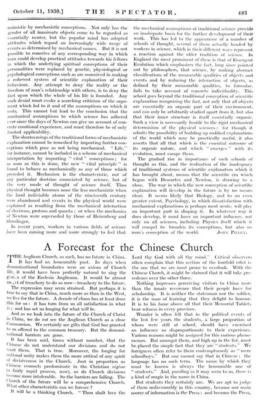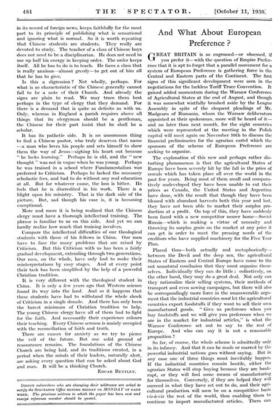A Forecast for th c Chinese Church
TUE Anglican Church, as such, has no future in China. It has had an honourable past. In days when denominational boundaries were an axiom of Church life, it would have been perfectly natural to sing the glor::s of the Ecclesia Anglicana. It would be almost an et of treachery to do so now—treachery to the future. The expression may seem strained. But perhaps it is true to say that in China, much more so than in the West, we live for the future. A decade of chaos has at least done this for us : it has torn from us all satisfaction in what ; and has set us longing for what will be.
And as we look into the future of the Church of Christ hi China, we do not see the Anglican Church as a close Communion. We certainly see gifts that God has granted to us offered to the common treasury. But the denomi- national barriers are gone.
It has been said, times without number, that the Chinese do not understand our divisions and do not want them. That is true. Moreover, the longing for national unity makes them the more critical of any spirit of divisiveness in the Church. Just in proportion as Chinese counsels predominate in the Christian regime (a fairly rapid process, now), so do Church divisions become more intolerable. So the barriers are falling. The Church of the future will be a comprehensive Church. What other characteristic can we foresee ?
It will he a thinking Church. "Thou shalt love the
Lord thy God with all thy mind.- Critical observers often complain that this section of the fourfold edict is the one that we arc most prone to overlook. With the Chinese Church, it might be claimed that it will take pre- cedence over the other three.
Nothing impresses perceiving visitors to China more than the innate reverence that their people have for scholarship. It is neither the statesman nor the soldier, it is the man of learning that they delight to honour. It is to his fame above all that their Memorial Tablets bear witness in every province.
Wonder is often felt that in the political events of the last few years the students, a large proportion of whom were still at school, should have exercised an influence so disproportionate to their experience. Various reasons might be assigned for this curious pheno- menon. But amongst them, and high up in the list, must be placed the simple fact that they arc "students." We foreigners often refer to them contemptuously as " mere schoolboys." But one cannot say that in Chinese : the language has no such term. The name by which they must be known is always the honourable one of "students." And, puzzling as it may seem to us, there is a kind of magic in the name in China.
. But students they certainly are. We arc apt to judge of them unfavourably in this country, because our main source of information is the Press : and because the Press, in its record of foreign news, keeps faithfully for the most part to its principle of publishing what is sensational and ignoring what is normal. So it is worth repeating that Chinese students are students. They really are devoted to study. The teacher of a class of Chinese boys does not need to be a disciplinarian. He does not need to use up half his energy in keeping order. The order keeps itself. All he has to do is to teach. He faces a class that is really anxious—almost greedy—to get out of him all that he has to give.
Is this a digression ? Not wholly, perhaps. For what is so characteristic of the Chinese generally cannot fail to be a note of their Church. And already the signs are plain to read. We may trace them best perhaps in the type of clergy that they demand. For there is a demand that is quite as definite as with us. Only, whereas in England a parish requires above all things that its clergyman should be a gentleman, the Chinese for their part insist that he shall be a scholar.
It has its pathetic side. It is no uncommon thing to find a Chinese pastor, who truly deserves that name —a man who loves his people and sets himself to show them the way of Jesus—sighing his heart out because "he lacks learning." Perhaps he is old, and the "new thought " was not in vogue when he was young. Perhaps he was trained in a school where Fundamentalism was preferred to Criticism. Perhaps he lacked the necessary scholastic fees, and had to do without any real education at all. But for whatever cause, the loss is bitter. He feels that he is discredited in his work. There is a blight upon his ministry. That is the dark side of the picture. But, sad though his case is, it is becoming exceptional.
More and more it is being realized that the Chinese clergy must have a thorough intellectual training. The phrase is familiar to us on this side. And yet we can hardly realize how much that training involves.
Compare the intellectual difficulties of our theological students with those of his fellows in China. Our men have to face the many problems that are raised by Criticism. But this Criticism with us has been a fairly gradual development, extending through two generations. Our men, on the whole, have only had to make their reinterpretations by easy stages. And at every point their task has been simplified by the help of a powerful Christian tradition.
It is very different with the theological student in China. It is only a few years ago that Western science found its way into the land. And so it happens that these students have had to withstand the whole shock of Criticism in a single decade. And there has only been the barest minimum of Christian tradition to help. The young Chinese clergy have all of them had to fight for the faith. And necessarily their experience colours their teaching. Every Chinese sermon is mainly occupied with the reconciliation of faith and truth.
There are causes for anxiety as we try to pierce the veil of the future. But one solid ground of reassurance remains. The foundations of the Chinese Church are being laid, and its traditions created, in a period when the minds of their leaders, naturally alert, are asking every question that can be asked about God and man. It will be a thinking Church.
EDGAR BENTLEY.









































 Previous page
Previous page